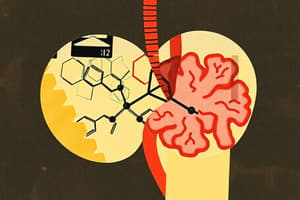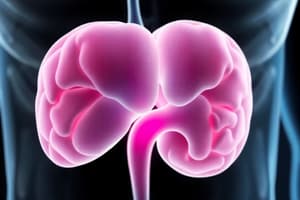Podcast
Questions and Answers
What mechanism primarily regulates the synthesis of aldosterone?
What mechanism primarily regulates the synthesis of aldosterone?
- Renin-angiotensin system (correct)
- ACTH secretion
- Cortisol feedback inhibition
- Sodium concentration in plasma
Which of the following statements about aldosterone transport in plasma is correct?
Which of the following statements about aldosterone transport in plasma is correct?
- It is bound to albumin only
- It is highly protein-bound
- It is mostly free in plasma (correct)
- It is bound to cortisol
Which of the following hormones is primarily responsible for maintaining the growth of the zona glomerulosa?
Which of the following hormones is primarily responsible for maintaining the growth of the zona glomerulosa?
- Mineralocorticoids
- Glucocorticoids
- DHEA
- ACTH (correct)
What characteristic feature is commonly observed in individuals with Cushing's syndrome?
What characteristic feature is commonly observed in individuals with Cushing's syndrome?
What is the primary effect of cortisol on glucose metabolism?
What is the primary effect of cortisol on glucose metabolism?
In the context of Cushing's syndrome, what role does ACTH play?
In the context of Cushing's syndrome, what role does ACTH play?
What physiological factor is known to influence plasma cortisol concentrations significantly?
What physiological factor is known to influence plasma cortisol concentrations significantly?
Which symptom is associated with increased protein catabolism due to elevated cortisol levels?
Which symptom is associated with increased protein catabolism due to elevated cortisol levels?
Which adrenal hormone is responsible for stimulating the exchange of sodium for potassium and hydrogen ions?
Which adrenal hormone is responsible for stimulating the exchange of sodium for potassium and hydrogen ions?
Which layer of the adrenal cortex is responsible for the secretion of aldosterone?
Which layer of the adrenal cortex is responsible for the secretion of aldosterone?
What effect does physical or mental stress have on ACTH secretion?
What effect does physical or mental stress have on ACTH secretion?
What effect does cortisol have on potassium levels?
What effect does cortisol have on potassium levels?
What is the primary hormone released from the anterior pituitary gland that stimulates the adrenal cortex?
What is the primary hormone released from the anterior pituitary gland that stimulates the adrenal cortex?
What is a common psychiatric symptom observed in patients with excess cortisol production?
What is a common psychiatric symptom observed in patients with excess cortisol production?
Which glucocorticoid processing method allows for their excretion in urine?
Which glucocorticoid processing method allows for their excretion in urine?
What role does cortisol play in the body?
What role does cortisol play in the body?
Which condition is not typically associated with elevated levels of ACTH?
Which condition is not typically associated with elevated levels of ACTH?
What causes hypertension in the context of increased cortisol levels?
What causes hypertension in the context of increased cortisol levels?
Which statement about glucocorticoids is TRUE?
Which statement about glucocorticoids is TRUE?
How does high plasma free cortisol concentration affect hormone secretion?
How does high plasma free cortisol concentration affect hormone secretion?
In cases of ectopic ACTH secretion, which cancer is most commonly associated?
In cases of ectopic ACTH secretion, which cancer is most commonly associated?
What is the biological status of cortisone in the context of adrenal gland secretion?
What is the biological status of cortisone in the context of adrenal gland secretion?
Which physiological role does the adrenal medulla primarily serve?
Which physiological role does the adrenal medulla primarily serve?
What substance is primarily responsible for carrying cortisol in circulation?
What substance is primarily responsible for carrying cortisol in circulation?
Which condition is NOT associated with mimicking Cushing's syndrome?
Which condition is NOT associated with mimicking Cushing's syndrome?
What effect does stress have on ACTH secretion in Pseudo-Cushing’s?
What effect does stress have on ACTH secretion in Pseudo-Cushing’s?
What does a failure to suppress plasma cortisol to less than 50 nmol/L indicate?
What does a failure to suppress plasma cortisol to less than 50 nmol/L indicate?
In which scenario would plasma ACTH levels be detectable?
In which scenario would plasma ACTH levels be detectable?
What does a normal result in the low-dose overnight dexamethasone suppression test indicate?
What does a normal result in the low-dose overnight dexamethasone suppression test indicate?
What is the main purpose of measuring urinary free cortisol?
What is the main purpose of measuring urinary free cortisol?
What clinical feature is typically observed in patients with Pseudo-Cushing’s due to severe alcohol abuse?
What clinical feature is typically observed in patients with Pseudo-Cushing’s due to severe alcohol abuse?
What is the significance of checking cortisol concentrations in both morning and evening?
What is the significance of checking cortisol concentrations in both morning and evening?
Which of the following is NOT a characteristic feature of Addison’s disease?
Which of the following is NOT a characteristic feature of Addison’s disease?
What effect do corticosteroids have on ACTH release in long-term use?
What effect do corticosteroids have on ACTH release in long-term use?
In secondary adrenal hypofunction, what is the expected ACTH concentration level?
In secondary adrenal hypofunction, what is the expected ACTH concentration level?
What does a raised plasma ACTH concentration indicate?
What does a raised plasma ACTH concentration indicate?
What is the primary purpose of the Synacthen stimulation test?
What is the primary purpose of the Synacthen stimulation test?
During the Synacthen test, what is considered a normal increase in plasma cortisol concentration?
During the Synacthen test, what is considered a normal increase in plasma cortisol concentration?
Which of the following symptoms may indicate secondary adrenal hypofunction?
Which of the following symptoms may indicate secondary adrenal hypofunction?
What differentiates primary adrenal hypofunction from secondary adrenal hypofunction?
What differentiates primary adrenal hypofunction from secondary adrenal hypofunction?
Flashcards are hidden until you start studying
Study Notes
The Adrenal Gland
- The adrenal gland is divided into two functionally distinct parts: the adrenal cortex, which is part of the hypothalamic-pituitary-adrenal axis, and the adrenal medulla, which is part of the sympathetic nervous system.
- The adrenal cortex consists of three layers:
- Zona glomerulosa: Secretes aldosterone.
- Zona fasciculata: Secretes cortisol.
- Zona reticularis: Secretes androgens.
- Steroid hormones are derived from cholesterol.
The Hypothalamic-Pituitary-Adrenal Axis
- The hypothalamus, anterior pituitary gland, and adrenal cortex form a functional unit.
- Cortisol synthesis and secretion are stimulated by ACTH released from the anterior pituitary gland.
- ACTH secretion is dependent on corticotrophin-releasing hormone (CRH) released from the hypothalamus.
- High plasma free cortisol concentrations suppress CRH secretion (negative feedback).
Glucocorticoids
- Cortisol and corticosterone are naturally occurring glucocorticoids.
- They stimulate gluconeogenesis and the breakdown of protein and fat, which antagonizes some of insulin's action.
- Glucocorticoids in excess may impair glucose tolerance and alter adipose tissue distribution.
- Cortisol helps maintain extracellular fluid volume and normal blood pressure.
- Cortisol is bound to cortisol-binding globulin (CBG) and albumin.
- Cortisone is biologically inactive until converted to cortisol in vivo.
- Glucocorticoids are conjugated with glucuronate and sulfate in the liver to form inactive metabolites, which are excreted in the urine.
Mineralocorticoids (Aldosterone)
- Aldosterone is secreted from the zona glomerulosa of the adrenal cortex.
- Aldosterone synthesis is controlled by the renin-angiotensin system, not ACTH.
- ACTH maintains the growth of the zona glomerulosa.
- Aldosterone is not transported in plasma bound to specific proteins.
- Aldosterone stimulates the exchange of sodium for potassium and hydrogen ions across cell membranes, which is essential for sodium and water homeostasis.
- It is inactivated by hepatic conjugation and excreted in the urine.
Adrenal Androgens
- The main adrenal androgens are dehydroepiandrosterone (DHEA) and androstenedione.
- They promote protein synthesis.
- Testosterone is synthesized in the testes or ovaries, not the adrenal cortex.
- Most circulating androgens are bound to sex hormone-binding globulin (SHBG) and albumin.
- Adrenal and gonadal androgens undergo extensive peripheral interconversion and are conjugated in the liver, then excreted as glucuronides and sulfates in the urine.
Control of Cortisol Hormone Secrection
- Feedback control: High cortisol levels suppress CRH and ACTH secretion.
- Inherent rhythms (circadian rhythm): ACTH is secreted episodically, leading to cortisol secretion. Cortisol levels are highest in the morning and lowest at night.
- Physical or mental stress: Can override other mechanisms and cause sustained ACTH secretion.
Adrenocortical Hyperfunction: Cushing's Syndrome
- Causes:
- Iatrogenic: Excessive steroid treatment.
- Increased endogenous cortisol production:
- Cushing's disease: ACTH-dependent, associated with bilateral adrenal hyperplasia.
- Ectopic ACTH secretion: Usually from a small-cell carcinoma of the bronchus.
- Adrenal cortex tumors: ACTH-independent, with increased cortisol and decreased ACTH.
- Clinical and metabolic features:
- Obesity: Trunk and face.
- Impaired glucose tolerance and hyperglycemia.
- Increased protein catabolism: Muscle wasting, thin skin, osteoporosis, bruising, purple striae.
- Hypertension: Sodium and water retention.
- Androgen excess: Greasy skin, acne, hirsutism, menstrual disturbances.
- Psychiatric disturbances: Depression.
Investigation of Cushing's Syndrome
- Plasma cortisol concentrations: Morning and evening levels.
- 24-hour urinary free cortisol: Increased excretion.
- Low-dose overnight dexamethasone suppression test: Failure to suppress cortisol to less than 50 nmol/L suggests Cushing's syndrome.
- Plasma ACTH concentrations: Detectable only in ACTH-dependent Cushing's syndrome.
- High-dose dexamethasone suppression test: Useful for further evaluation.
Adrenocortical Hypofunction: Addison's Disease
- Characterized by low cortisol, high ACTH concentration, hypoglycemia, hypotension, pigmentation, hyponatremia, and hyperkalemia.
Secondary Adrenocortical Hypofunction
- ACTH release is impaired by disorders of the hypothalamus or anterior pituitary gland.
- Patients present with non-specific symptoms such as weight loss and tiredness.
- Hypoglycemia may occur due to increased insulin sensitivity.
- Pigmentation is absent because plasma ACTH concentrations are not raised.
- Characterized by low cortisol and low ACTH concentration.
Investigation of Adrenocortical Hypofunction
- Plasma cortisol concentrations: Low levels.
- Plasma ACTH concentrations: High levels indicate primary insufficiency, while low levels suggest secondary insufficiency.
- Tetracosactide (Synacthen) stimulation test: Given to assess the adrenal glands' response to ACTH.
- Normal response: Plasma cortisol increases by at least 200 nmol/L.
- Delayed response: Suggests secondary adrenocortical hypofunction.
- No response: Suggests primary adrenocortical hypofunction.
Studying That Suits You
Use AI to generate personalized quizzes and flashcards to suit your learning preferences.




